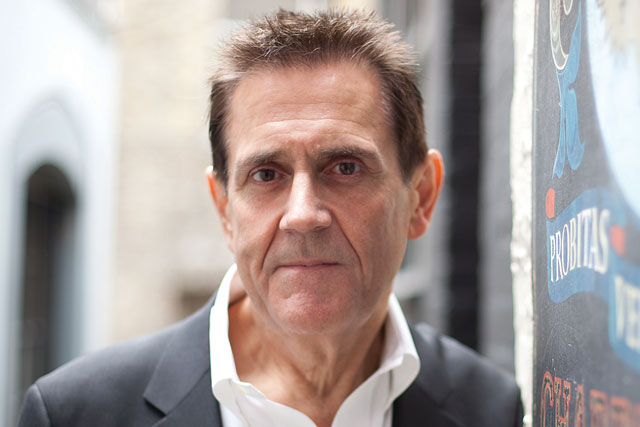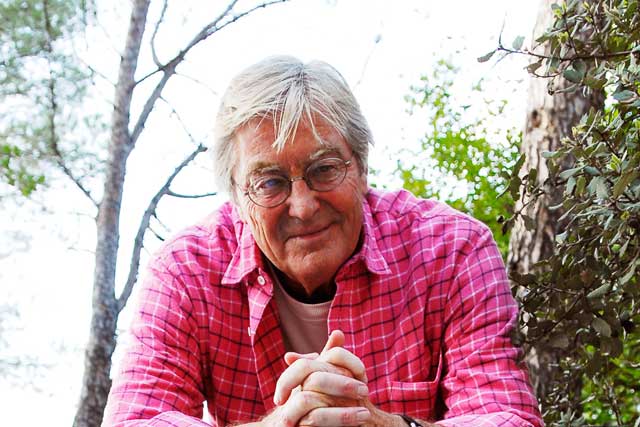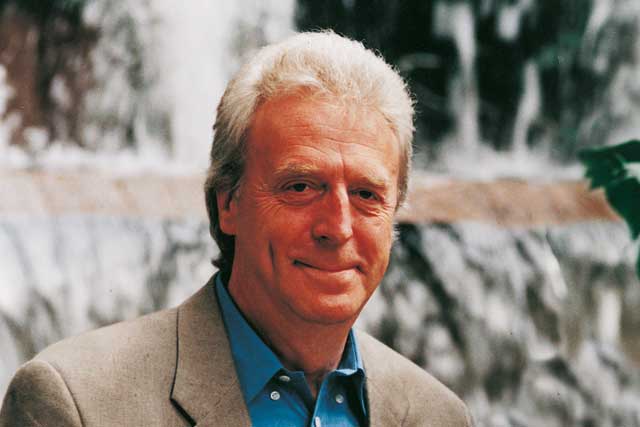DAVE TROTT
When we were young and the D&AD book arrived, we'd turn to the back of the Annual and see how many numbers we had after our name - and then look at our competitors and see how many numbers they had after their name.
It's better to be different than it is to try to be just slightly better. Be outrageous. Be daring. To be creative, you have to be free, you have to be able to make mistakes, you have to be naughty, and you have to be able to do things wrong.
PETER MAYLE
It was a very equal business. If you were good at what you did, it didn't matter if you had long hair or short hair. I mean, we had some guy called Yogi, who used to go around saying: "Never wear underwear, man, it's bad for you."
You met lots of interesting people, you did strange and wacky things from time to time, and you got paid a lot of money.
I mean, I was making more than the British Prime Minister when I was 26. And nowhere else at that time, short of being a movie star, could you expect to do as well as that.
I think one of the things that probably helped to encourage the revolution was the increasingly important role of the Designers and Art Directors Club, D&AD. It would produce this album every year of the best ads, the best copy, the best commercials, the best design and everything.
It became a point of honour to get in there with your work. And I think that it encouraged a lot of competition and encouraged standards to go up.
SIR ALAN PARKER
A lot of us were really young. I mean, it's extraordinary, really, when you think how young we were.
I think that it was a sign of the times, you know - it was the 60s, which was a very egalitarian time. No-one really was asking which degree you had or whatever. Particularly agencies such as CDP.
At CDP, Colin Millward, who was the boss and the absolute inspiration of everything that was wonderful at the agency, came from the Royal College of Art, so the art directors nearly always came from the Royal College of Art and so they had some sort of semblance of normal education. But the copywriters, such as Charles Saatchi, myself, Paul Waler and people like that, were kind of all misfits and we didn't really have any qualifications at all.
And, in a way, it was this mixture of odd misfit copywriters, put together with these very elegant well-trained art directors from the Royal College of Art, that then became this fantastic sort of combustive mixture, really.
I remember the first ad that I did for CDP (for Harvey's Bristol Cream) - John Pearce, the boss, read it and he said that they'd spent years trying to put Harvey's Bristol Cream on a pedestal and along comes Alan Parker and he starts selling it off of a barrow. I thought that summed us all up, really.
We were very competitive, particularly Charles and myself. I put a sign up in the corridor that said "creative department starts here" where my office was. Charlie's office was down the other end and, at lunchtime, someone turned the sign around so suddenly you reversed the whole situation.
If a script said we see this most beautiful model running along a beach in the Bahamas somewhere, then Ridley (Scott) always got that. And then if it said we see two boring, rather overweight, people sitting in a kitchen in Golders Green or somewhere, I got those.
I think most of us were doing it instinctively. We were incredibly young - I mean, we were all in our early twenties. It was quite amazing, really, that we were given such opportunities so young, and you never ever thought about it.
We were making kind of miniature films, really, feature films. I think that we were the first to do that and, therefore, they kind of stood out in the commercial break.
The beauty of it was that we were allowed the freedom to explore where a commercial could go.
The nature of the writing was that it wasn't pompous, it wasn't too fancy. It was actually quite colloquial, it was honest and real in its simplicity, and always connected to an idea.
But the most important thing about the ads was, actually, that they were talking to people in their own language. They weren't being pompous, they weren't being too high-brow, they weren't being too clever, and they were funny.
Ridley and I were going to combine our two companies at one time. We had lunch and Ridley said that it's going to be called RSA. Of course, I said no, it's not. He said, well, maybe it should be called Scott Parker, and I said, no mate, I think Parker Scott sounds better. We didn't get past that, so foolishly I never joined forces with him. I should have done because he was an extraordinarily brilliant businessman.
Charles got fed up with the film industry - it took him about ten minutes to get fed up with the film industry. His script didn't get made so he said: "Oh, I think I will open an agency with my brother instead." I always say the biggest mistake of my life was that my script got made and his didn't. Because if my script hadn't have got made, I could have owned the largest collection of modern art in the world and he could be a humble film director.
I'm very grateful to advertising. I mean, first of all, I absolutely would not have gone into feature films but for advertising. I wouldn't write screenplays but for the fact that I was a writer in advertising. I got the self-confidence to write by writing ads and I got the self-confidence to be a film director by directing them.
And the most important thing is that if you're shooting once a week, week in week out, you do learn your craft. Advertising was my film school.
LORD DAVID PUTTNAM
The work was everything. So instead of being asked how was my relationship with the client, I'd be asked did I sell the ad yesterday? And if not, why not?
You had a far greater fear of coming back to the agency having not sold the campaign than you had of the client.
There was no question about which was the greater failure. Losing a client was an unfortunate; not selling a campaign was catastrophic. So you are all your energy - all your impetus was to sell the work that was being created.
And we were doing, at one point, an ad a day - which was pretty hard work. It was more like working on a newspaper than it was working in an ad agency. But it was very exciting, and what was good won a lot of awards. I was a very early member of D&AD. We cleaned up, I think, in 1964 - I remember we totally cleaned up in the awards.
In hindsight, I think I was part of something extraordinarily important. I mean, really, highly significant. I was part of a change that took place in Britain, which has proved to be irreversible.
Some of that change has been excellent. But if you told me in the 60s that I was part of the generation that super-charged consumerism, and the potential downside of that, I think I might have been worried. I reflect a lot about what the overall impact has been on the society that we helped to create.
But it was a hugely important change and I think the most important aspect of it is that we didn't know we were doing it. That's not just a defence, that's a fact.
And because of that innocence, we did it well. I cling on to that - I cling to the fact that I was part of something that was beautiful, actually.
LORD TIM BELL
Why did I want to go into advertising? 'Cos I had to earn my living ...
It was a very exciting business, which people talked about.
And I'm ashamed to admit that I quite like being visible and having a profile.
The dynamic was that we were only interested in producing advertising that worked. We weren't interested in producing advertising that retained the status quo.
The whole point about advertising is that it should be controversial. It should make the audience react. Of course, you would like most of the reaction to be positive. But reaction is what you want.
Well - what better group of people to challenge assumptions than a bunch of young upstarts. In the same way that the internet generation - Facebook, Twitter etc - has completely challenged the old order, that's what we were doing. Except that it was in a tiny narrow world called advertising.
Yeah, I had Ferraris and Maseratis and I swanned around. And, you know, I bought sharp suits.
I mean, the lifestyle was what happened in those days. And it's the way that people were. We were the product.
SIR JOHN HEGARTY
Cramer Saatchi was like an ideas factory on steroids - we worked out that we had to have a new campaign every week to pay the rent. You just had to have an idea that day - if you didn't have an idea that day, you didn't get paid.
I have always thought Charlie (Saatchi) was a brilliant boss in that he made the people around him feel they could be better than they actually were. And I think that is a great skill.
I think the function of advertising is to constantly try to capture the mood and feeling of the people, and reflect it back in a way that is both positive and energising.
We'd hire a farting dog with bad breath and only three legs if it could come up with a brilliant idea. We genuinely would.
Anthropologists, you know, 500 years from now won't necessarily read a book about a period of time. They'll just get an ad out.
SIR FRANK LOWE
We went into advertising because it was a lark - you got paid lots of money, there were lots of lovely girls and you got a nice, fast car ...
You just couldn't believe your luck.
Certainly, long lunches were the order of the day. But the focus was entirely on the work. It was all about doing wonderful work.
D&AD was as important as the One Show was. It has a book. It has an Annual and it's not just the winners, it's all the work of that year that is going to be good. And so if you're a creative man, to have your work in a book of record means a great deal, which other festivals don't have.
SIR RIDLEY SCOTT
The only thing that counts, really, is the end result - money is secondary and always was. I'd spend more money on overtime than anybody else - I'd be up until 3 or 4am on a bloody pack shot, but these things could have gone in the Museum of Modern Art. In fact, some did end up in the Museum of Modern Art. And so I really didn't care because what I was delivering was quality - it was all about quality and getting it right.
People used to get up from their chair to go and get a beer when the programme started, but make sure they got back for the commercial break.
The commercial breaks in those days were better than the TV shows - and those were the days when commercials were, I believe, influencing feature films, communication, editing etc, because the ground was completely exploratory.





